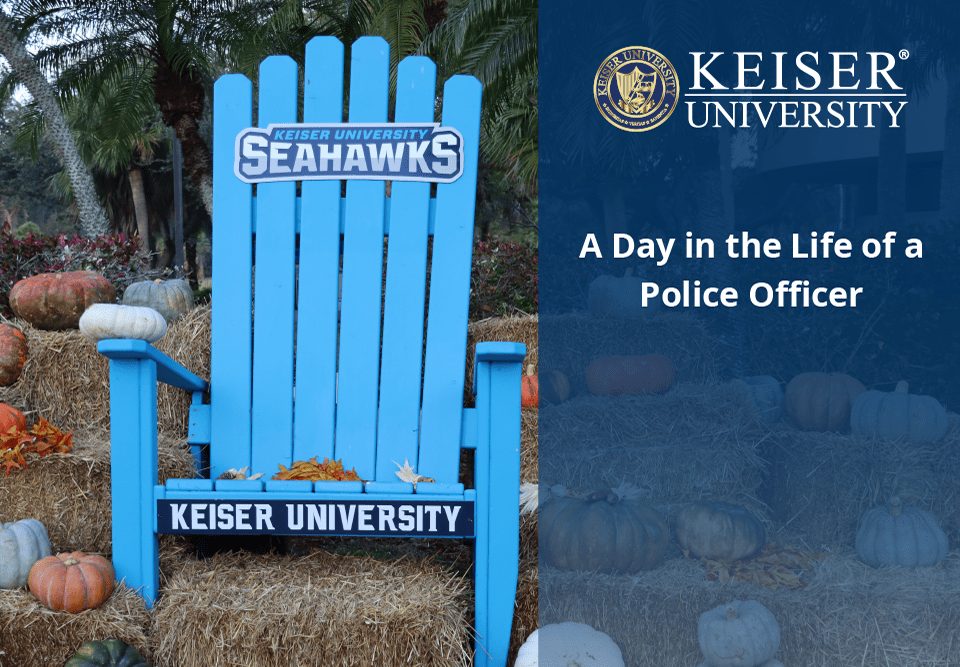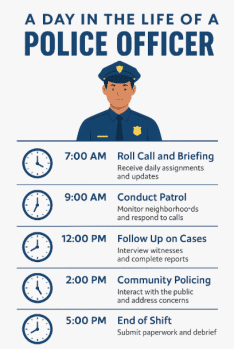From patrolling neighborhoods and working their beats to answering emergency calls, police officers play a pivotal part in keeping their communities safe. If you could see yourself making a difference as a police officer, you might be wondering what a typical day in the life of a police officer looks like.
No two days for a police officer ever look exactly alike, which is part of what draws many people to this dynamic and fast-paced profession. Still, there are some basic realities you can expect if you decide to pursue this rewarding career path.
Start of the Shift: Preparation and Briefings
Typically, a day in the life of police officer duties begins with roll call and a thorough equipment check before officers begin patrolling or answering calls.
Roll Call and Assignments
During roll call, groups of officers working the same shift will meet at a designated location — usually a department or district precinct — to discuss the goals for their police shift work with a supervisor (such as a lieutenant). At this time, supervisors may also assign officers to specific law enforcement duties, like conducting traffic stops, serving search warrants or being on the lookout for a suspect vehicle. Roll call is also a good time for officers to get up to speed on what happened in their districts or beats during the previous shift.
Equipment Check
Performing an equipment check is essential before heading out to patrol, as officers rely on a variety of tools to keep themselves safe and do their jobs effectively. Some of the most important equipment and tools officers will not work without include:
- Uniform (unless working a covert assignment)
- Radio
- Handcuffs
- Bulletproof vest
- Body camera
- Duty weapon
- Patrol car (or unmarked car, for undercover work)
Police Officer Roles, Responsibilities and Schedules
It is also worth noting that the specific roles and responsibilities of a police officer can vary based on their assignments, although most of these professionals routinely need to file reports and interview both witnesses and suspects.
Patrol vs. Detective vs. K9 Unit
Three of the most common assignments for police officers include:
- Patrol – These are the everyday police officers you see working their beats, answering calls and making traffic stops.
- Detective – These police officers are specifically designated to investigate, collect/analyze evidence and build cases to arrest suspects of crimes.
- K9 – These are officers who work with police dogs, receiving specialized training on proper handling and commands. They are often called upon to track suspects who have fled or are in hiding. K9 units may also be used for locating drugs or other contraband.
Working Nights, Weekends and Holidays
Because crime does not take days off, police officers are often required to work nights, weekends and holidays. Many departments, for example, work on a “letter day” schedule — with each letter corresponding to a different set of days on (and days off) throughout the year. Depending on staffing, officers with some seniority may be able to request certain holidays off or make other special scheduling requests, but this can vary by department.
Filing Reports and Incident Documentation
No matter their assignment, police officers need to know how to write and file detailed reports of incidents that they respond to, especially if a crime has been committed and an arrest has been made. This documentation can be used in court to help convict suspects, so accuracy and attention to detail are critical.
Interviewing Witnesses and Suspects
Police officers also must be comfortable interviewing both witnesses and suspects when a crime occurs. This can help them determine whether an arrest can be made while gathering other key details that could assist in prosecuting a crime.
On Patrol: Core Responsibilities Throughout the Day
For officers who end up working patrol assignments, daily (or nightly) responsibilities may range from answering emergency calls to conducting traffic stops and proactively interacting with people in the community. Here are some types of police patrols:
Responding to 911 Calls
When 911 calls come in, emergency dispatchers assign them to police officers based on their availability and proximity to the situation at hand.
Emergency Response and Public Safety Situations
Police officers respond to any number of emergency calls, with common examples including:
- Residential/business burglar alarms
- Traffic accidents with injuries
- Crimes in progress (like thefts and robberies)
- Active threats, such as shooters and/or hostage situations
Aside from emergency calls (which are given priority), officers also respond to non-emergency calls involving scenarios like:
- Disturbances
- Property crimes (e.g., vandalism)
- Traffic accidents without injuries
Routine Patrol Duties
When they are not actively answering calls, police officers may be expected to patrol their communities proactively and maintain a visible presence. During this time, they might seek out vehicle infractions to make traffic stops, stumble upon a crime in progress or even be flagged down for help by a citizen.
Community Policing and Engagement: Interacting With Citizens and Building Public Trust
Another central aspect of the job for police officers is building relationships with the community, which can strengthen trust and cooperation between police departments and citizens. Officers may do this by simply stopping to speak with members of the community during their shifts, although some might participate in special engagement events (like neighborhood watch meetings or community forums) for additional presence.
Working With Other Agencies and Departments
Collaboration is a crucial element of any police officer’s job, especially while on patrol — as officers often need to work together with other officers and dispatchers to establish and maintain order. However, officers may also find themselves needing to work with other agencies and departments as part of their everyday work.
Collaboration With Fire/EMS
It is not uncommon for police officers to be dispatched to fire department and EMS runs, particularly when there may be a crime involved or a need to restore order amidst the chaos. Officers must be able to work with firefighters and EMS to gather relevant information (when needed) and keep scenes secure.
Cooperation With Detectives or Federal Authorities
Officers might also work with others in law enforcement to help them solve crimes. For example, detectives or federal agents investigating crimes may speak with the officers who responded to the original 911 calls.
High-Stress Moments and Decision-Making
Part of working as a police officer entails the ability to keep calm under pressure and handle high-stress situations, often making split-second decisions that could affect people’s safety.
Handling Dangerous or Unpredictable Situations
Police officers respond to various dangerous and unpredictable situations on a regular basis, with some of the most frequent including:
- Vehicle pursuits
- Arrests met with resistance
- Mental health crises
- Active shooters
When these kinds of scenarios arise, officers draw upon their training to remain calm and take the right actions.
Using De-escalation Techniques
When situations become especially dangerous or tense, officers may need to rely on de-escalation techniques to avoid the use of force or resolve conflicts and crises peacefully. This could include engaging in active listening and lending an empathetic ear, as well as maintaining physical distance from a perceived threat. Regardless of the strategies employed, officers have an incentive to stay calm and composed under stress — and to remain prepared to respond to further escalations.
End of Shift: Debriefing and Reflection
As an officer’s shift wraps up, there are a few more items to be completed before returning home.
Logging Reports and Equipment Turn-In
Before officers punch out for the day, they must make sure any reports they took during the shift are completed and submitted. In some departments, equipment may be shared, so it is also important for officers to turn their equipment in at the end of their shifts. Other departments may allow officers to take their equipment home, but this varies.
For departments without take-home patrol cars, officers leave the keys to their patrol cars behind for officers on the next shift to use. Officers permitted to take their cars home may need to follow certain policies, such as keeping the vehicle within a certain radius of the city.
Emotional Toll and Coping Mechanisms
Police work is rewarding, but it can certainly take a mental and emotional toll. Police officers often encounter people on the worst days of their lives, and maintaining compassion and empathy can be mentally taxing over time. Thus, it is essential for officers to develop healthy coping mechanisms to deal with stress from work.
Along with getting plenty of sleep and maintaining a healthy diet, officers are encouraged to find healthy ways to de-stress after work. Mindfulness exercises, meditation and even peer support groups or professional counseling can go a long way — as can participating in a hobby that is not related to law enforcement.
Career Pathways and Advancement in Law Enforcement
Working in patrol can serve as a solid starting point for those in law enforcement, but there exist plenty of opportunities for advancement with the right level of experience and education.
Specialized Units (Narcotics, Cybercrime, SWAT)
After some time with the department, police officers may be able to apply to work for specialized units that focus on specific types of crimes or responses to crimes. For example, narcotics officers work to keep drugs (and dealers) off the streets. Meanwhile, cybercrime detectives may focus more on investigating and making arrests related to crime online. Some departments also have Special Weapons and Tactics (SWAT) teams that respond to high-risk emergency circumstances (like hostage situations and barricaded persons).
Promotion Opportunities (Sergeant, Lieutenant, Chief)
In addition to exploring specialized units, officers may be considered for leadership positions and work their way up the chain of command with enough experience. Typically, the chain of command looks something like this:
- Police officer/detective
- Sergeant
- Lieutenant
- Captain
- Assistant chief
- Chief
Frequently Asked Questions
Have additional questions about the life of a cop? We answer several below:
What time does a police officer’s day start?
The start time for a police officer’s day can vary greatly depending on their shift. Because police departments are a 24/7 operation, most departments have a day shift, middle shift and night shift — so officers can expect their day to start according to the shift they have been assigned.
What kind of calls do police respond to most often?
According to one study, residential burglary alarm activation calls are the most common among police departments, accounting for roughly 8% of all calls.
Do police officers work 12-hour shifts?
In some departments, 12-hour shifts are the norm. For departments where this is the case, officers typically work fewer days per week (with more days off) in exchange for the longer shifts. Other departments may opt for 10-hour shifts.
How dangerous is a typical day on the job?
Although police officer is considered among the most dangerous occupations in the United States, in the reality of a typical day in the life of a police officer, data from the Bureau of Labor Statistics (BLS) shows that it is more likely for them to be affected by non-fatal or non-violent injuries or illness than any other cause.
Is a Career as a Police Officer Right for You?
With insight into a day in the life of a police officer, you may be in a better place to determine whether this path could be right for you. And while no two days on the job look the same, that is part of the appeal for those who want a career that is anything but monotonous.
If you are interested in making a difference as a police officer or taking your criminal justice education to the next level, Keiser University offers multiple graduate-level criminal justice programs flexible to your needs:
- Master of Arts in Criminal Justice (MACJ)
- Master of Arts in Criminal Justice, Interdisciplinary Studies (MACJ-IS)
- Doctor of Criminal Justice (DCJ)
- Doctor of Philosophy (PhD) in Criminal Justice and Criminology
Learn more about any of these programs by reaching out to a graduate school admissions counselor or take the next step by starting your online application today.
Sources
https://www.keiseruniversity.edu/graduate-school/contact/graduate-admissions-counselor/
https://www.keiseruniversity.edu/criminal-justice-macj-interdisciplinary-studies/
https://www.keiseruniversity.edu/master-of-arts-in-criminal-justice-macj/
https://www.keiseruniversity.edu/doctor-of-criminal-justice-dcj/
https://www.keiseruniversity.edu/criminal-justice-and-criminology-phd/
https://www.bls.gov/ooh/protective-service/police-and-detectives.htm
https://www.nena.org/page/911statistics
https://pmc.ncbi.nlm.nih.gov/articles/PMC9885068/
https://www.policechiefmagazine.org/de-escalation-everyday-police-ops/
https://www.police1.com/active-shooter/updated-data-on-the-most-dangerous-call-in-law-enforcement
https://portal.cops.usdoj.gov/resourcecenter/RIC/Publications/cops-p221-pub.pdf
https://pmc.ncbi.nlm.nih.gov/articles/PMC9551139/
https://www.ojp.gov/ncjrs/virtual-library/abstracts/police-report-writing-1
https://intime.com/resources/blog/pros-and-cons-of-different-police-schedules/
https://www.newhavenindependent.org/article/police_dispatch_stats
https://www.bls.gov/iif/factsheets/fatal-occupational-injuries-police-2018.htm







 The instructors at Keiser University impacted my life. They believed in my ability to become a great graphic designer, regardless of how I felt about my skills. KU helped to prepare me for the real world and got me to where I am today.
The instructors at Keiser University impacted my life. They believed in my ability to become a great graphic designer, regardless of how I felt about my skills. KU helped to prepare me for the real world and got me to where I am today.
